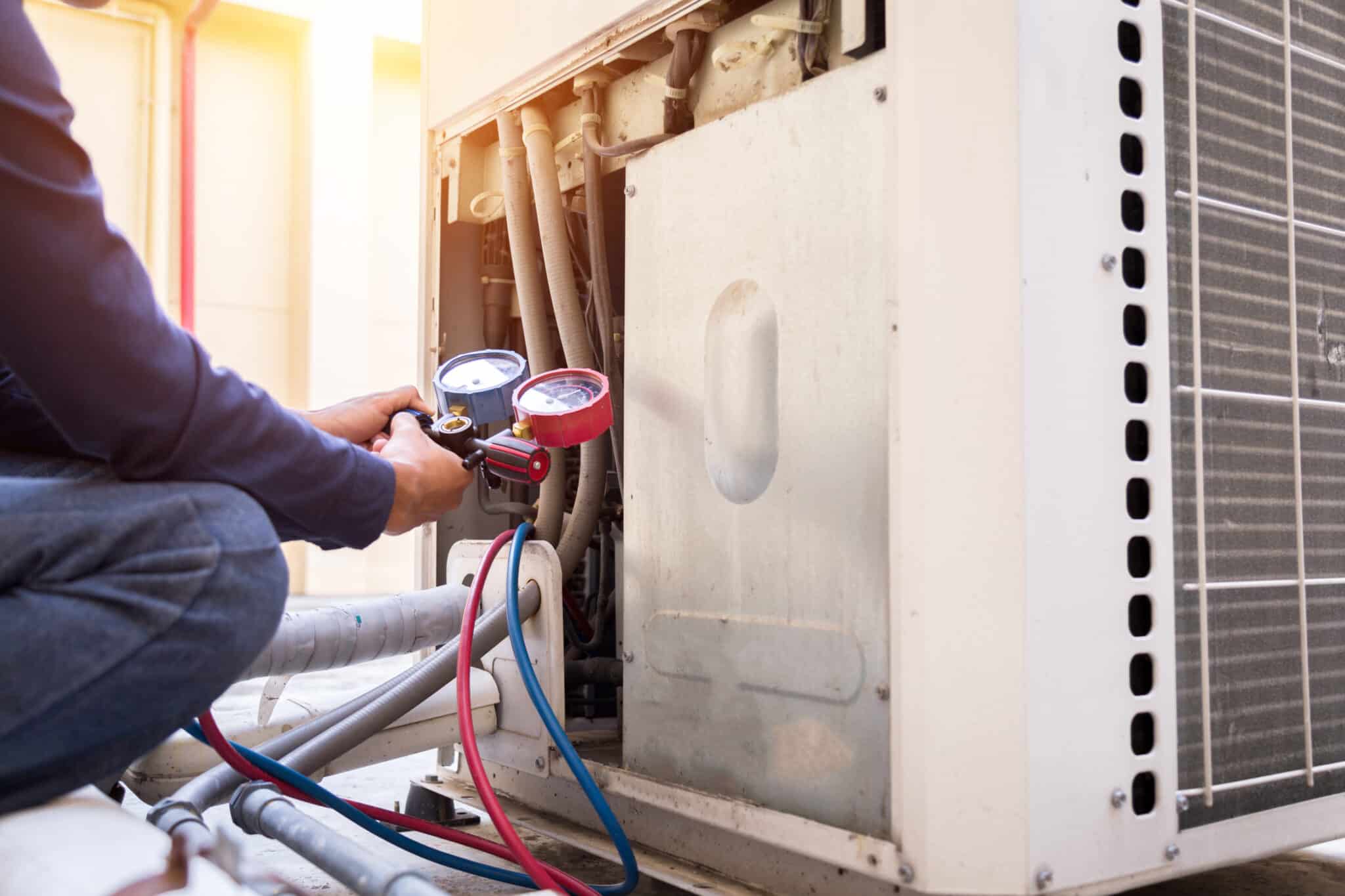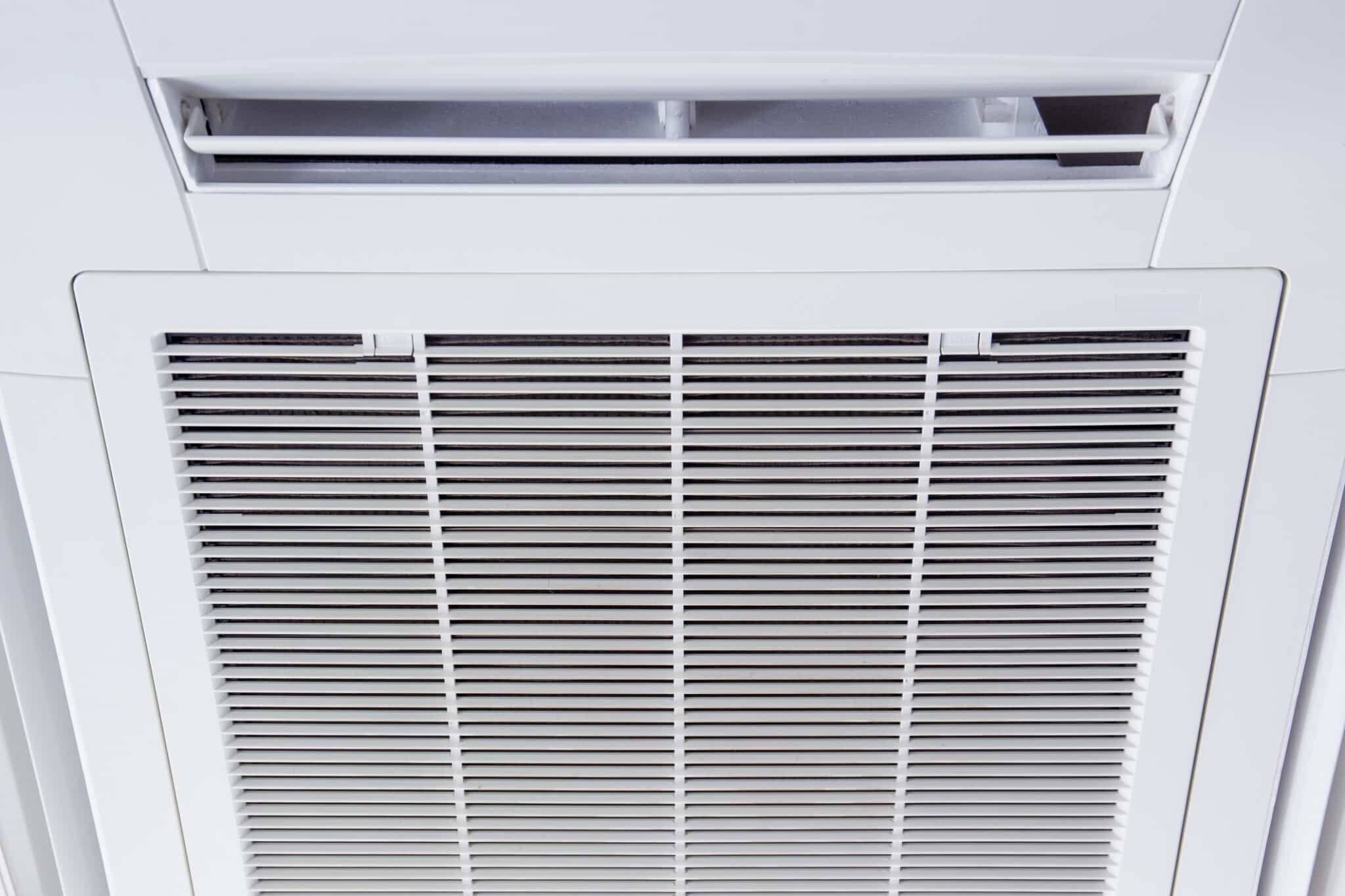- Extend your AC unit’s life by ensuring regular maintenance and smart usage.
- Routine tasks like changing filters, cleaning coils, and optimizing airflow can prevent breakdowns.
- Professional inspections and tune-ups catch small issues early, saving you from costly repairs.
- Strategically reduce AC usage by adjusting thermostat settings and using ceiling fans to lessen strain.
- Duct cleaning and proper airflow management improve efficiency and extend your AC’s lifespan.
- By following these practices, you can enjoy lower energy bills, a comfortable home, and a more durable AC unit.
Have you ever wondered how much money you could save by extending the life of your AC unit?
The answer might surprise you. Prolonging your air conditioner’s lifespan is not just a smart financial decision; it also has a significant impact on the environment.
A well-maintained AC unit runs more efficiently, which means lower energy bills. When your unit lasts longer, you delay the expensive process of purchasing and installing a new one.
Taking care of your air conditioner is a win-win situation. It saves you money, helps the environment, and keeps your home comfortable. In the next sections, we’ll explore how regular maintenance and smart usage can help you achieve these benefits.

Regular AC Maintenance: The Key to Longevity
Did you know that regular maintenance is the secret to keeping your AC unit running smoothly for years? Routine AC maintenance isn’t just a recommendation; it’s a necessity if you want to extend the life of your system and maintain its efficiency.
The most crucial maintenance tasks include cleaning or replacing filters, inspecting and cleaning the coils, checking refrigerant levels, and ensuring the thermostat is working correctly. These tasks help prevent the buildup of dirt and debris, which can cause your AC unit to work harder than it needs to, leading to wear and tear over time.
How often should you perform these maintenance tasks? Experts suggest a comprehensive check-up at least once a year, ideally before the start of the cooling season. However, some tasks, like filter changes, should be done more frequently—about every 1 to 3 months, depending on your usage and the type of filter your unit uses.
Scheduling regular professional inspections is another key to ensuring your AC unit’s longevity. An experienced technician can spot potential issues before they become major problems. During a professional tune-up, technicians will examine all components of your AC system, clean any dirty parts, and make any necessary adjustments or repairs. This proactive approach helps keep your unit running efficiently and can significantly extend its lifespan.
Remember, skipping regular maintenance might save you time now, but it could lead to costly repairs or even a premature replacement of your AC unit. By staying on top of these essential tasks, you ensure that your air conditioner continues to keep your home cool and comfortable for as long as possible.
Give Your AC Unit a Rest
Is your air conditioner working overtime? Giving your AC unit a break not only reduces wear and tear but also helps extend its lifespan. Strategically reducing AC usage is an effective way to keep your system running efficiently for years to come.
One simple strategy is to adjust your thermostat settings. Setting your thermostat a few degrees higher when you’re away or during cooler parts of the day can significantly reduce the strain on your AC unit. The U.S. Department of Energy recommends setting your thermostat to 78°F when you’re home and raising it when you’re away. This small change can save you up to 10% on cooling costs annually while also giving your AC a much-needed break.
Another effective approach is using programmable or smart thermostats. These devices allow you to automate your home’s temperature settings, ensuring that your AC only runs when necessary. For instance, you can program the thermostat to cool the house just before you return home, so you walk into a comfortable environment without having the AC run all day. This reduces unnecessary energy consumption and minimizes wear on your unit.
Ceiling fans and natural ventilation can also play a crucial role in giving your AC unit a rest. Ceiling fans help circulate cool air more efficiently, allowing you to set your thermostat higher without sacrificing comfort. On cooler days, consider turning off your AC altogether and opening windows to let in fresh air. This not only reduces your energy usage but also gives your AC unit a break from continuous operation.
By strategically reducing the workload on your AC unit, you not only save on energy costs but also extend the life of your system. Small adjustments in your daily routine can make a big difference in how long your AC unit lasts, ensuring you get the most out of your investment.
Regular Filter Changes
When was the last time you changed your AC filter? Regular filter changes are one of the simplest yet most effective ways to extend the life of your AC unit. Dirty filters can severely impact your system’s efficiency, leading to higher energy bills and increased wear and tear.
The primary function of an AC filter is to trap dust, dirt, and other airborne particles, preventing them from entering your system and clogging essential components like the coils and blower. Over time, however, these filters can become clogged, restricting airflow and forcing your AC to work harder to maintain the desired temperature. This not only increases your energy consumption but can also lead to overheating and potential damage to your unit.
So, how often should you change your AC filter? The answer depends on several factors, including the type of filter you use, the air quality in your home, and how often you run your system. As a general rule, disposable filters should be replaced every 1 to 3 months. If you have pets, allergies, or live in a dusty area, you may need to change your filters more frequently. On the other hand, high-efficiency filters designed to last longer may only need to be replaced every 6 to 12 months.
Remember, a clean filter not only helps your AC unit run more efficiently but also improves the air quality in your home by reducing the number of allergens and pollutants circulating through your system. Keeping up with regular filter changes is a small task that can make a big difference in the performance and longevity of your air conditioner.
Don’t underestimate the importance of changing your AC filters regularly. It’s an easy and inexpensive way to ensure your unit operates at peak efficiency and lasts as long as possible.
Clean Your AC Unit’s Coils
Have you noticed your AC unit struggling to keep your home cool? Dirty coils might be to blame. Cleaning your AC unit’s coils is essential for maintaining its efficiency and prolonging its lifespan. Over time, the evaporator and condenser coils inside your unit can collect dirt, dust, and debris, which hampers their ability to absorb and release heat.
Let’s start with the evaporator coil, which is located inside the indoor unit. This coil absorbs the heat from your home’s air, making it cool and comfortable. When the coil is covered in dirt, it can’t absorb as much heat, causing your AC to work harder and reduce its efficiency. On the other hand, the condenser coil is located outside your home and releases the absorbed heat into the air. If the condenser coil is dirty, it can’t efficiently expel heat, leading to higher energy usage and potential overheating of the system.
Cleaning your AC unit’s coils is a task you can handle yourself with some basic tools. Here’s a step-by-step guide:
- Turn off the power to your AC unit to ensure safety.
- Remove any debris around the outdoor unit, such as leaves or dirt.
- Access the coils by removing the unit’s outer cover.
- Use a soft brush or a vacuum cleaner to gently clean the coils, removing any accumulated dirt and dust.
- For stubborn dirt, use a no-rinse coil cleaner, spraying it directly onto the coils and allowing it to foam and lift away debris.
- Rinse the coils with water, if necessary, and allow them to dry before replacing the cover and restoring power.
Regularly cleaning the coils, at least once a year, ensures your AC unit runs efficiently and prevents unnecessary strain on the system. This simple maintenance task can reduce your energy bills, prevent breakdowns, and extend the life of your AC unit.
Keeping your AC coils clean is crucial for optimal performance and longevity. Don’t wait until your system starts struggling—make coil cleaning a part of your regular maintenance routine.

The Role of Duct Cleaning
Have you ever considered how the cleanliness of your ductwork affects your AC unit? Dirty ducts can be a hidden culprit behind many common air conditioning problems, including reduced efficiency and increased wear on your system. Keeping your ducts clean is essential for maintaining your AC unit’s longevity and ensuring that it operates at peak performance.
When your ducts are filled with dust, dirt, and other debris, airflow becomes restricted. This means your AC unit has to work harder to circulate cool air throughout your home, leading to higher energy bills and unnecessary strain on the system. Over time, this extra workload can shorten the lifespan of your AC unit, leading to costly repairs or even the need for a full replacement.
Dirty ducts can also negatively impact your home’s indoor air quality. As your AC unit pushes air through contaminated ducts, allergens, mold spores, and other pollutants can be dispersed into your living spaces. This not only makes your home less comfortable but can also exacerbate allergies and other respiratory issues for you and your family.
So, how do you know when it’s time to clean your ducts? Here are a few signs to look out for:
- Visible dust or debris around your vents.
- Mold growth inside the ducts or around the HVAC system.
- Inconsistent airflow in different rooms of your home.
- Increased allergy symptoms or respiratory issues among household members.
- Unpleasant odors coming from your vents.
If you notice any of these issues, it’s time to schedule a professional duct cleaning. The process involves using specialized tools to dislodge dirt and debris, which are then removed with a high-powered vacuum. Most experts recommend having your ducts cleaned every 3 to 5 years, depending on factors like your home’s location, the presence of pets, and your overall air quality.
Regular duct cleaning not only helps your AC unit run more efficiently but also improves the air you breathe. It’s a vital step in maintaining the longevity of your air conditioning system and ensuring a comfortable, healthy home environment.
Optimize Airflow
Is your AC unit not cooling your home as effectively as it used to? The problem might be related to airflow. Ensuring proper circulation of air throughout your home is crucial for maintaining your AC unit’s efficiency and extending its lifespan.
When airflow is restricted, your AC system has to work harder to distribute cool air, leading to higher energy consumption and increased wear on the unit. Poor airflow can also cause certain areas of your home to feel warmer than others, creating an uncomfortable living environment. Fortunately, there are several simple steps you can take to optimize airflow and keep your AC running smoothly.
First, make sure that all vents and registers in your home are open and unobstructed. Furniture, curtains, and other household items can block vents, preventing cool air from circulating properly. By ensuring that vents are clear, you allow air to flow freely, reducing the strain on your AC unit.
Next, clean your vents and registers regularly. Dust and debris can accumulate in these areas, obstructing airflow and reducing the efficiency of your system. Use a vacuum cleaner with a brush attachment to remove dust from the vent covers and the duct openings. This simple task can make a big difference in how well your AC system performs.
Another important factor in optimizing airflow is ensuring proper ductwork design and maintenance. If your ducts are poorly designed, kinked, or leaking, they can significantly reduce the efficiency of your AC unit. A professional HVAC technician can inspect your ductwork for any issues and recommend solutions, such as sealing leaks or reconfiguring ducts, to improve airflow.
Finally, consider using ceiling fans to help circulate air throughout your home. Ceiling fans create a breeze that helps distribute cool air more evenly, allowing you to set your thermostat a few degrees higher without sacrificing comfort. This reduces the workload on your AC unit and can extend its lifespan.
By taking these steps to optimize airflow, you not only improve the comfort of your home but also ensure that your AC unit operates efficiently and lasts as long as possible.
Inspections and Tune-ups
When was the last time you had your AC unit professionally inspected? Regular inspections and tune-ups are vital to extending the life of your air conditioner and keeping it running efficiently. Just like a car needs routine maintenance to perform well, your AC unit requires regular check-ups to catch potential issues before they become costly problems.
Professional inspections should be done at least once a year, ideally before the start of the cooling season. During an inspection, a certified HVAC technician will thoroughly examine your AC unit, checking for any signs of wear and tear, leaks, or other issues that could affect its performance. They will inspect the system’s components, including the coils, filters, and refrigerant levels, to ensure everything is in good working order.
One of the key benefits of regular inspections is the ability to identify small problems early on. For example, a minor refrigerant leak might not cause immediate issues, but if left unchecked, it can lead to compressor failure, which is one of the most expensive repairs for an AC unit. By catching these problems early, you can avoid major breakdowns and extend the lifespan of your system.
In addition to inspections, scheduling annual tune-ups is crucial. A tune-up typically includes cleaning and adjusting the system’s components to optimize performance. This might involve cleaning the evaporator and condenser coils, tightening electrical connections, lubricating moving parts, and calibrating the thermostat. These adjustments help your AC unit run more efficiently, reducing energy consumption and minimizing wear and tear on the system.
During a tune-up, the technician may also provide valuable advice on how to maintain your unit between visits, such as how often to change the filters or tips on reducing energy usage. This proactive approach ensures your AC unit is always in peak condition, ready to keep your home cool and comfortable throughout the summer months.
Don’t wait for your AC to break down before you call a professional. Regular inspections and tune-ups are essential for extending the life of your air conditioner and keeping it operating at its best.
FAQs: Extending the Life of Your AC Unit
-
How often should I have my AC unit serviced?
You should have your AC unit serviced at least once a year, preferably in the spring before the cooling season begins. Regular maintenance ensures your system runs efficiently and helps catch potential issues early.
-
What are the signs that my AC unit needs maintenance?
Common signs include reduced cooling efficiency, unusual noises, higher energy bills, and uneven cooling in different rooms. If you notice any of these issues, it’s time to schedule a maintenance check.
-
How can I improve my AC unit’s efficiency?
You can improve efficiency by regularly changing the filters, cleaning the coils, ensuring proper airflow, using a programmable thermostat, and scheduling regular professional tune-ups.
-
Is duct cleaning really necessary for my AC unit’s longevity?
Yes, duct cleaning is important. Dirty ducts can restrict airflow, forcing your AC unit to work harder and reducing its lifespan. Clean ducts ensure efficient operation and better indoor air quality.
-
Can I do AC maintenance myself, or should I hire a professional?
While you can handle basic tasks like changing filters and cleaning vents, it’s best to hire a professional for comprehensive maintenance. A certified technician has the expertise to spot and fix potential problems that could shorten your AC unit’s lifespan.





